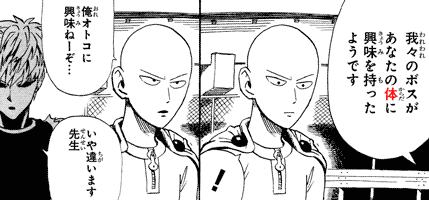What does you da ようだ mean in Japanese?
Most likely, it means "it seems that (something is true)" or "(this thing) is like/is similar to (this other thing)." Syntactically, this is you 様 followed by the da だ copula (you desu ようです is polite form). There are also other words pronounced you よう it could be, like you 用, "business," but normally only you 様 is spelled with hiragana. For example:
- kanojo wa marude {tenshi no} you da
彼女はまるで天使のようだ
She completely is like {an angel}.
She is just like {an angel}. - douyara {muda no} you da
どうやら無駄のようだ
It seems {it is futile} after all. - {sekai ga owatta ka no} you da
世界が終わったかのようだ
It's like {the world ended}.
It's as if {the world had ended}. - nan'no you da?
なんのようだ?
What sort of business [do you have with me]?
Grammar
See the article about you 様 for details about the grammar. This article is only to list examples.
The phrase you na ような is the attributive form of you da, while you ni ように is the adverbial form.
Examples
Manga: One Punch Man, Wanpanman ワンパンマン (Chapter 9)
- Context: a caped baldy with extreme strength is targeted by an evil organization. He interrogates one the bad guys concerning why they're after him.
- {wareware no bosu ga anata no karada ni kyoumi wo motta} you desu
我々のボスがあなたの体に興味を持ったようです
It seems {our boss [got interested] in your body}.- ~ni kyoumi wo motte-iru
に興味を持っている
To have interest in.
To be interested in. - motsu - an eventive verb meaning "to get." Once something has been gotten (present perfect), it means "to have," motte-iru, consequently kyoumi wo motte-iru means "to have interest" in the present, while kyoumi wo motta 興味を持った (past perfective) refers to when "interest" was first gotten, the moment someone "became interested" in something.
- ~ni kyoumi wo motte-iru
- !
- ore, otoko ni kyoumi nee zo...
俺オトコに興味ねーぞ・・・
I don't have interest in men... - iya, chigaimasu, sensei
いや違います先生
No, [you got it wrong], master.- They aren't "interested" as in "attracted," they are "interested" in why he's so physically powerful.

No comments: